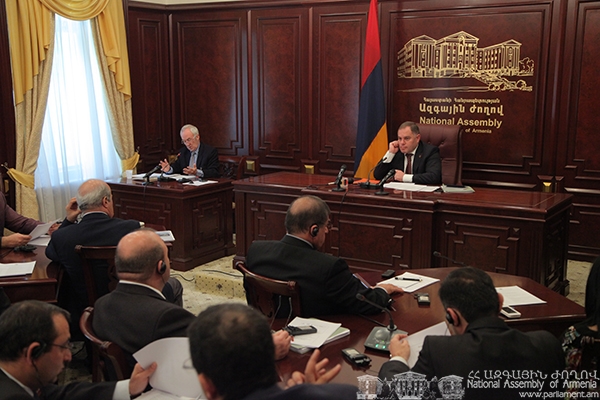RA National Assembly Press Service informs that on October 28 the RA NA Standing Committee on State and Legal Affairs moderated by Hovhannes Sahakyan organized parliamentary hearings on the theme “The Role of the Standing Committees in the Legislative Process: International Experience.” Alistair Doherty, Parliamentary Strengthening Consultant, the member of the NA Standing Committee on State and Legal Affairs Artsvik Minasyan and Alan Page, OSCE/ODIHR expert, Professor of Public Law, made key reports during the hearings.
Alistair Doherty in his report has touched upon the role of the Standing Committees in parliament of Great Britain. He has noted that in parliament of the United Kingdom the problem of the Committee is to force the Government to defend its viewpoint after making amendment to the draft law during the plenary sitting. In Great Britain the Standing Committee can have a legislative initiative, which means that the parliament creates privileged status for the Committee or for every member. Besides, the Committee is authorised to make certain amendments to the draft law, which makes the members of the Government to be more careful towards their work. The expert has also mentioned that in Great Britain there exist two kinds of Standing Committees: legislative and audit.
In his report the NA deputy Artsvik Minasyan has highlighted the necessity of financing the committees. The deputy has presented the experience existing in different European countries, noticing that, as in Armenia, in Latvia, Lithuania and Estonia the Committees are financed. In his opinion, in that way the committee is given an opportunity to work. Touching upon the number of the RA NA Standing Committees, he does not consider it overdone, as according to the RA Constitution, there is a right of having 12 Standing Committees. To him, there are committees which can be united.
Alan Page, OSCE/ODIHR expert, Professor of Public Law, in his report has noted that the committees are inseparable from many legislators’ working activities. To his observation, the Standing Committees have important advantages in terms of professionalism, detailed study, consultation and the involvement of the public. For example, in France, as a result of debate, the committee can reject or pass the draft law with the amendments or without them. In Portugal, the committees are responsible for preliminary debates of the bills, and in Serbia the study of the bill by an authorised committee precedes its debate by the National Assembly. Here the Committees can hold public hearings of the bill.
Photo by parliament.am.















